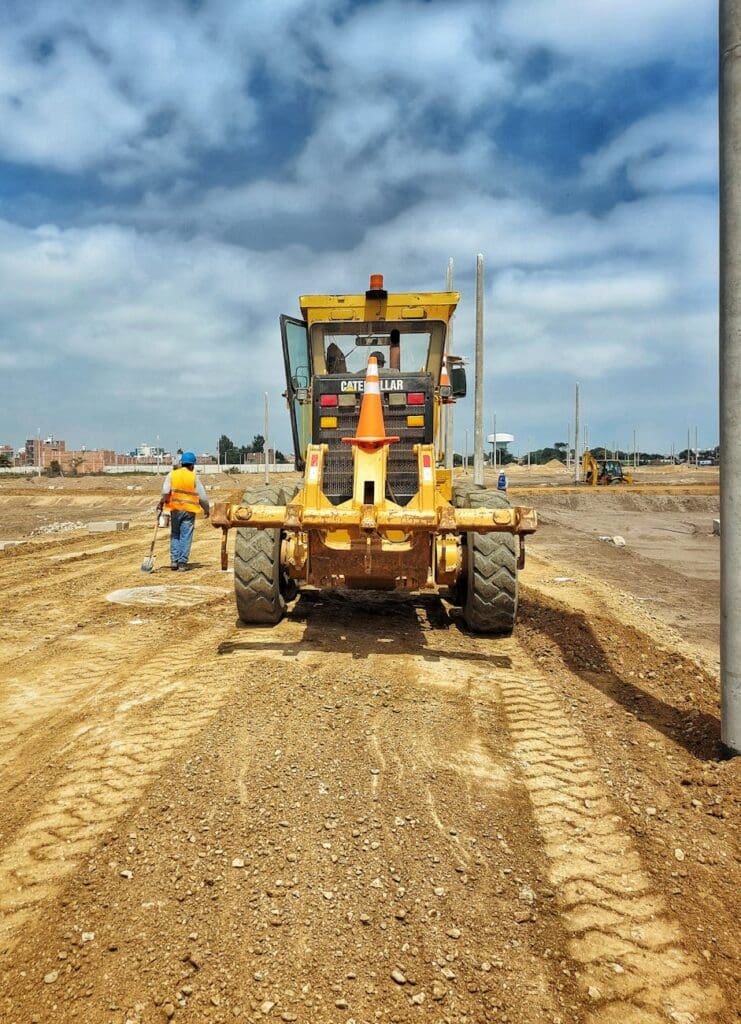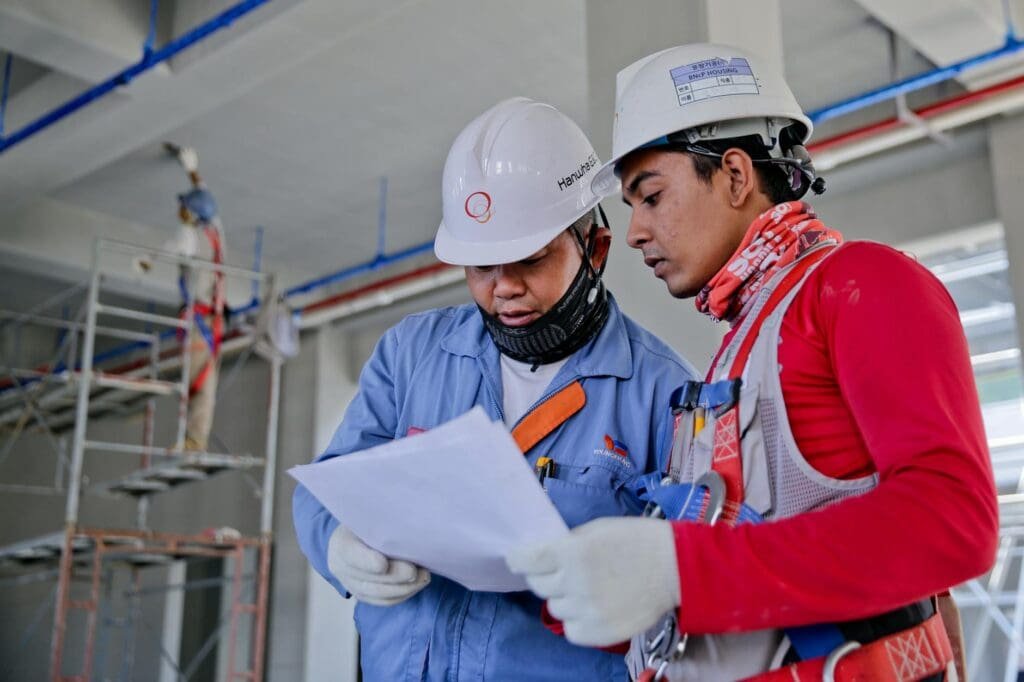A Look at Grading and Site Preparation in Construction
Grading essentially involves leveling the ground for the project, whether it’s the foundation for a building, a base for a road, or landscaping.
Not just a mere act of flattening, grading is crucial because:
1. It lays a strong foundation for construction.
2. It manages water run-off.
3. It prevents soil erosion.
4. It preps the site for subsequent landscaping.
On the other hand, ‘site preparation’ refers to the activities done to ready a plot for construction.”
This might include clearing the land, getting rid of debris, or, you guessed it- grading.
The takeaway?
Grading and site preparation aren’t just fancy construction jargon. They’re at the heart of building projects, ensuring a solid base and readying the land for whatever comes next.
Table of Contents
Professional Tips for Cost-Effective Grading and Site Preparation

Understanding the Fundamentals of Grading and Site Preparation
Before we jump into the details, let’s first understand what grading and site preparation involves.
This is crucial in understanding how to carry out these processes in a cost-effective manner.
What is grading?
Grading is the process of leveling or shaping the ground to create a specific slope or plane. This process ensures the site is properly leveled and has adequate drainage.
What is site preparation?
Site preparation involves readying a piece of land for construction. This usually includes tasks like clearing and excavating the land, removing debris, rocks, trees, and also involves grading.
Professional Tips for Cost-Effective Grading and Site Preparation
Following are the professional strategies for cost-effective grading and site preparation.
1. Conduct Thorough Site Survey and Analysis
Failure to properly assess the site can lead to unexpected costs. Make sure to understand the composition of the soil, check for groundwater or potential rock formations.
2. Clear Site Debris About it and Efficiently
Quick and efficient removal of site dеbris саn helр to avoid any potentiаl dеlaуs or fines from loсаl rеgulаtions.
3. Efficient resource and waste management
Managing resources efficiently and minimizing waste can save considerable costs.
4. Hire Experienced Professionals
Experienced professionals can significantly reduce errors, rework, and save time.
5. Check For Utility Lines
Avoid costly repairs by checking for utility lines before starting site preparation.
In Summary
A deep understanding of grading and site preparation is crucial before you start any construction project. A thorough site analysis, efficient resource management, hiring experienced professionals can ensure cost-effectiveness. Most importantly, always plan well and expect the unexpected.
Remember, cost-effectiveness doesn’t mean compromising on safety standards. Balancing between cost-effectiveness and safety will lead to a successful construction project.
Understanding the Cost of Grading and Site Preparation in Construction

Developing an accurate budget forecast for a construction project is an intricate task. One important component to consider is the expense related to the grading and site preparation. Understanding these costs can significantly impact your project’s overall budget.
Factors That Influence the Cost of Grading and Site Preparation
Various aspects can impact the overall cost of grading and site preparation. While not exhaustive, these are some of the most pertinent aspects to consider:
- Project size
- Site accessibility
- Soil condition
- Location
- Terrain steepness
Project Size
The bigger the site, the more resources are needed in terms of labor, equipment, and time, resulting in higher costs.
Site Accessibility
If a site is hard to reach, extra resources may be required, further increasing the cost.
Soil Condition
Most projects require an initially firm or at least stable ground. Thus, the condition of the soil significantly affects the cost, mainly if additional work like soil remediation or compaction is necessary.
Location
The cost of certain tasks may vary greatly depending on the site’s geographic location due to varying local regulations and cost of living.
Terrain Steepness
Sloping terrains may need more extensive grading services compared to flat ones, leading to increased costs.
Estimated Cost Analysis
While costs can vary dramatically depending on a wide range of factors, some industry averages can provide a basic guideline.
| Task | Average Cost |
|---|---|
| Site Clearing | $1,500 – $5,000 |
| Grading | $1,250 – $4,500 |
| Site Preparation | $1,200 – $4,200 |
Cost figures are averages and can vary based on factors listed previously (source: HomeAdvisor).
Final Thoughts
Grading and site preparation are vital phases in any construction project. These costs can fluctuate depending on many factors, so it’s always best to get an accurate cost analysis from professional contractors or construction cost estimating services.
Essential Equipment for Grading and Site Preparation
Understanding the right tools and machines for grading and site preparation are the key to efficient construction work. The following are common types of equipment used in site preparation.
Excavators
Excavators are heavy construction equipment consisting of a boom, dipper (or stick), bucket and cab on a rotating platform known as the “house”. They are used for a variety of tasks including digging, material handling, demolition, and grading.
Types of Excavators
Different excavators are used based on the specific needs of the project. Here are key ones:
- Crawler Excavator
- Dragline Excavator
- Backhoe
Bulldozers
Bulldozers are incredibly strong and the best choice for large scale soil and earth moving work. Their heavy and powerful design makes them ideal for moving large amounts of dirt around a construction site.
Graders
These last types of heavy machinery really shine in the grading process. A grader, also commonly referred to as a road grader or a motor grader, is a construction machine with a long blade used to create a flat surface during site preparation.
| Equipment | Use |
|---|---|
| Excavators | Used for digging, material handling, demolition, and grading. |
| Bulldozers | Used for large scale soil and earth moving work. |
| Graders | Used to create a flat surface during site preparation. |
These mentioned types of heavy-duty machinery form the core of what’s needed for ensuring successful site grading and preparation.
Remember, each construction project may vary, and depending on the specific requirements, not all equipment may be necessary. It’s always best to consult with a professional construction company to identify which ones are best suited for your project.
The Skinny On Site Prep & Grading
In our exploration of construction terminology, we’ve discovered the importance and interconnectedness of both “grading” and “site preparation”.
Grading not only levels a site, but also provides a sturdy base for construction, helps control surface runoff, and prevents erosion.
Site preparation, although including grading in its steps, is a more comprehensive process that ensures a construction site is fully prepared and environmentally clean.
With this understanding, we’ve found that these two terms are fundamental to the pre-construction stage and result in smoother construction processes and higher-quality output.
Differentiating between the two allows project managers and workers to communicate effectively and execute their tasks efficiently. It is, therefore, crucial to comprehend these terms when delving into any construction project.






